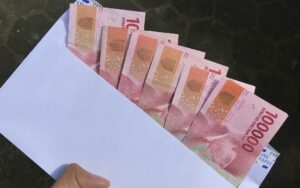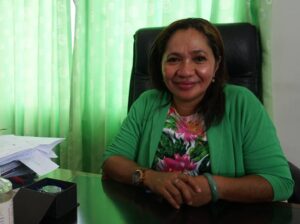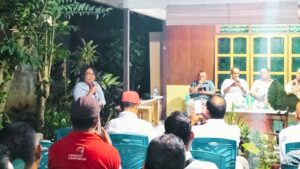
The island of Sumatra is the region with the highest level of reporting on money politics in the 2019 simultaneous regional head elections. Based on data from the Election Supervisory Body (Bawaslu) listed on the Datatalk.asia website, the number of reports related to money politics reached 147 cases representing 7.3 percent of the total reports violations in Sumatra. Thus, almost a third of the 550 political-related reports nationally occurred in western Indonesia. While the Kalimantan region occupies the second position with the number of reports on money politics reaching 6.4 percent, followed by Sulawesi 5.3 percent.
Even so, the reports on money politics that were complained to the Supervisory agency were only the tip of the iceberg. The polls by the Indonesian Survey Institute (LSI) on the Post-Election 2019 showed about 33 percent of voters claimed that they were offered money or gifts in exchange for their votes. The number is equivalent to 63.5 million of the 192 million voters registered in the voters list (DPT) Election 2019. Therefore, Indonesia called simply the better of the two countries on the African continent, Uganda and the Republic of Benin.
One case that was sticking out is the arrest of the former lawmaker of the Golkar Party faction, Bowo Sidik Pangarso. He was arrested with evidence of IDR 8 billion, divided into 400 thousand envelopes containing denominations of IDR 20,000 to IDR 50,000. The money stored in 82 boxes and 2 plastic containers was admitted to be distributed to the voters.
In addition, the Pekanbaru Supervisory agency also confiscated money worth IDR 506 million, which was prepared by four members of the legislative candidate’s campaign team. Meanwhile in Nias, the provincial lawmaker candidate from the Gerindra Party was arrested along with three successful teams who were ready to distribute IDR 48 million to 2,400 people. While the West Sulawesi provincial lawmaker candidates were arrested while distributing money amounting to IDR 200,000 per person in one of the houses in the village Sumarrang, Polewali Mandar
Executive Director of the Indonesian Democratic Network (JaDI) of North Sumatra, Nazir Salim Manik, assesses that the high tension of money politics, especially in the legislative election, was caused by the failure of parties to promote their candidates to voters. In the past 2019 elections, no party that carries the programmatic and participatory campaign. The relationship of the voters among with the candidate, according to him, is merely transactional. “The party does not make its cadres or legislative members build a relationship between those who vote and those who are elected,” Nazir said in an interview on Wednesday, July 21 2021.
This condition was then getting worse by the undemocratic system of determining candidates and electoral districts nominees. In the case in North Sumatra on the 2019 election, he said, several legislative candidates were often placed in electoral districts that were not the locations of their constituents. This has resulted in the candidates choosing a shortcut by buying and selling votes (vote-buying).
While the existing legal instruments of Bawaslu are not strong enough to break the chain of money politics. This can be seen from the lack of cases of money politics that have been successfully completed the Integrated Legal Enforcement (Gakkumdu). Money politics cases tend to be choked for the reasons there are difficult evidentiary. “It should be a Parties, organizers, educate voters so that they have reasonable reasons to votes the candidates other than money. We expect that the party will build it so that the upcoming 2024 election the burden will not only be on the candidates,” said Nazir.
Executive Director of Political Indicators Indonesia, Burhanuddin Muhtadi stated that the design of the political institutions with the multiparty system became one of the most influential factors in money politics. The 2019 legislative elections bring the 16 political parties to competing for 575 seats at the national level. Even so, the party in Indonesia had no ideological differences since the end of the New Order. This makes it difficult for voters to distinguish one party from another. “So that voter behavior is determined more personal campaign strategy rather than the party platform,” he wrote in the journal Money Politics and New Normal in the Post-New Order Elections published in the Integrity Journal of the Corruption Eradication Commission in mid-2019 ago.
The magnitude of the influence of personal campaigns in elections, according to Burhanuddin, correlates to the increase in money politics from election to election. According to him, money politics is the most effective compared to other campaign methods, such as club goods strategies, intimidating voters, visiting voters, or campaigning via social media. The effectiveness of money politics is at least able to pick up 10 percent of the voters. “If we take the highest estimate, one of the three people in Indonesia has become an easy target for vote-buying,” he said.
The transaction money in the election is based on the record, the Association for Elections and Democracy (Perludem) not only occurs between the candidates and voters. According to the researcher of Perludem, Heroik Pratama, the vote-buying process also involves voting organizers.
The decision of the Election Organizing Honorary Council (DKPP) for the April-December 2019 period shows that vote counting and recapitulation is a critical stage where frequent violations. Among other things, the organizers’ negligence in translating regulations and witness conspiracy, as well as election organizers. “The counting and recapitulation stages are the most vulnerable stages because they are related to the vote acquisition which determines whether or not a candidate passes in the election,” he said.
In the 2019 election, according to Heroik, ad-hoc organizers often carried out elections fraud at the vote recapitulation stage. It was done on a massive scale at the district level. s only witnessed by the organizers, witnesses, and supervisors. He said this was the impact of the low integrity of the organizers, as well as the lack of public participation during the process of election stages. “The lower the public participation in overseeing the recapitulation process, the more prone to electoral malpractice,” said Heroik.
For example, in the voting process in Depok, Sleman, and Yogyakarta, one of the sub-district polling committees members is proven to manipulate the data of votes United Development Party (PPP), the National Democratic (Nasdem), and the Berkarya Party. He was later sentenced to four months in prison with a probationary period of six months, and a fine of IDR 5,000,000 for has caused thousands of votes to be lost and switching to other parties.
However, the dismantling of money politics between organizers and voters is not an easy task. According to Heroik, what the Integrated Law Enforcement Center (Sentra Gakkumdu) has done so far has not been effective enough to resolve the case of money politics. In the case of bribery of the PDI-P candidate, Harun Masiku, to a former commissioner of the election commission, Wahyu Setiawan, he gave an example, which is still unclear. There were also cases a member of the sub-district polling committee in West Cikarang, that intentionally omitted copies of the C1 Hologram at 12 polling stations in the 2019 election. Unfortunately, the trial did not reveal any relationship between the organizer and the beneficiary party.
In short, the time given by the legislation is also allegedly an obstacle for Supervisory Agency to prove the practice of political dowry. According to the Election Law, the Supervisory Agency only has time to follow up on the findings and reports of alleged violations no later than 3 days after the report is received.
In order to anticipate election violations, the Director of Politics and General Administration of the Ministry of Home Affairs, Bahtiar encourages the strengthening of public involvement in oversight. This is because until now, both the Commission and the Election Supervisory agency did not have enough tools to monitor the elections to the polling station level. While the government has limitations in terms of budget. Bahtiar said, it is because important for the organizers and the political parties to actively conduct voter education ahead of the upcoming 2024 election. “This reinforcement is assumed to strengthen the supervisory system of tiered on which the election Supervisory Agency to do its job,” he said.







